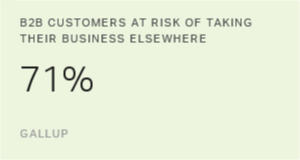WASHINGTON, D.C. -- Fewer than one in 10 college graduates who majored in business reported receiving emotional support from faculty, staff and other influential figures while in college (9%), the lowest level of four general undergraduate majors. By contrast, emotional support among college graduates who majored in the arts and humanities was double that of business majors, at 18%.
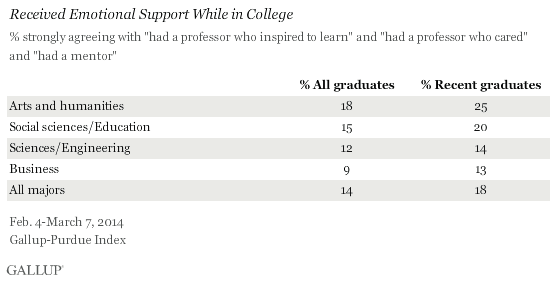
Graduates with social sciences/education majors (15%) and sciences/engineering majors (12%) rank second and third, respectively.
Gallup classifies whether a college graduate had "emotional support" by how graduates respond to three questions, each designed to see if the student received the intellectual leadership, guidance and care that can make a good education a great education. Graduates reply to the following questions on a five-point scale of strongly agree to strongly disagree:
- I had at least one professor at (University Name) who made me excited about learning.
- My professors at (University Name) cared about me as a person.
- While attending (University Name) I had a mentor who encouraged me to pursue my goals and dreams.
Gallup considers those who strongly agree with all three items to have had "emotional support" during their undergraduate education.
These results are based on the inaugural Gallup-Purdue Index, a joint research effort with Purdue University and Lumina Foundation to study the relationship between the college experience and college graduates' lives afterward. The Gallup-Purdue Index is a comprehensive, nationally representative study of U.S. college graduates of all ages with Internet access, conducted Feb. 4-March 7, 2014. According to a 2013 Census Bureau report, 90% of college graduates in the U.S. have access to the Internet.
Recent graduates -- those who donned a cap and gown between 2000 and 2014 -- generally report higher levels of emotional support during college than the overall average for all graduates, perhaps in part because memories of their college years are fresher than they are for older graduates. But recent graduates show about the same variation in emotional support by major -- with arts and humanities majors on top (25%), and social sciences/education majors following close behind (20%). However, recent business graduates (13%) are about as likely as science/engineering majors (14%) to report receiving emotional support during college.
Previous Gallup research has found that emotional support in college is associated with a higher likelihood of feeling engaged at work, though the exact mechanism producing this relationship is unclear. Gallup has also found that undergraduate business majors rank below all others in having a strong interest in the work they do. This implies that the comparatively low degree of emotional support business undergraduates appear to receive in school has lasting consequences, as Gallup has established that there are differences in well-being and employee engagement among alumni who have had these experiences.
Just About One in Two Business Majors Had Inspiring Professor
With about half (51%) of business majors saying they had a college professor who made them excited about learning, business students are the least likely of all college majors to report having a motivating professor. Seven in 10 arts and humanities majors say they had such a professor, and strong majorities of social sciences/education graduates (66%) and sciences/engineering graduates (58%) say they had this important experience.
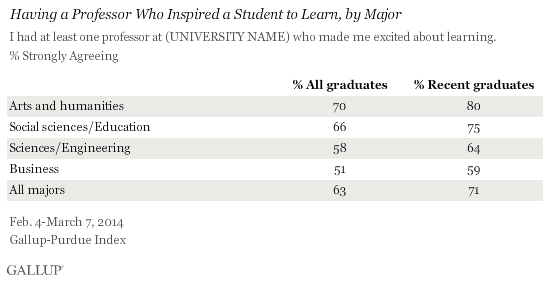
As a whole, recent college graduates are more likely than the overall average for graduates to say they had a professor who made them excited about learning. More than seven in 10 recent graduates report this important experience (71%), while 59% of all college graduates concur. As with emotional support, this may be because recent graduates are simply more likely to recall these individual details of their higher education. But among both groups of college graduates, business majors trail their academic counterparts studying other disciplines for both emotional support and having a professor who inspires learning.
Business Majors Well Behind Others in Having Had a Mentor
Equally vital to a student's development is having a mentor -- an individual, be it a professor, guidance counselor, coach, adviser or older student, who can guide a student through life's challenges and empower the student to pursue his or her dreams. While similar levels of college graduates studying in the fields of arts and humanities, social sciences and the sciences strongly agree with the statement that they had a mentor while in college, business majors are far behind. Fourteen percent of business graduates strongly agree with having a mentor, compared with 20% of science majors, 24% of social science majors and 26% of arts and humanities majors.
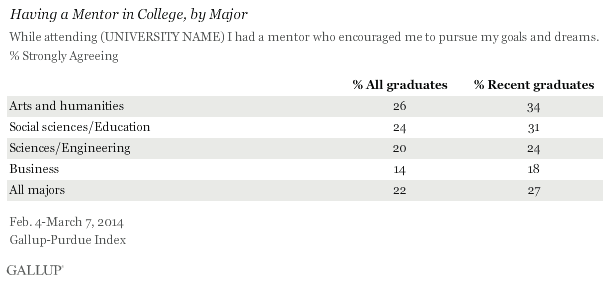
Likewise, recent graduates majoring in business are far behind students in the other majors in saying they had a mentor (18%), and in particular, are at about half the rate of arts and humanities majors (34%).
Closer Gaps Among Majors on Professor Who Cared
Arts and humanities majors are far more likely than students of other disciplines to say they had a professor who cared about them as a person -- 40% of recent graduates say this. In contrast, only one-third of social sciences and education majors report having this experience. Business majors and science and engineering majors trail far behind at 27% and 26%, respectively.
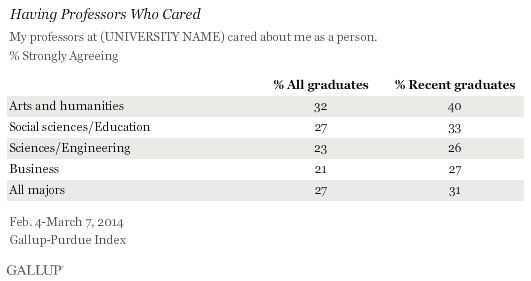
Bottom Line
Gallup research shows that having "emotional support" while in college is strongly associated with higher workplace engagement and overall well-being later in life. But not all college majors are receiving this type of support at equal levels. These differences may be because this type of support is not available to them in their school or department, or because students who elect to major in certain fields are more or less prone to seek out supportive relationships. Whatever the nature of the relationship, business majors, in particular, report having had lower levels of emotional support while in college than other majors, and these business majors lag other majors again when asked about their engagement and interest in their work after graduation.
Although a small minority of all graduates report getting this support, such reports are higher among more recent graduates. This could reflect differences in recollection among those whose colleges experiences are more recent, or could reflect a movement among colleges toward providing a more engaging and supportive environment as higher education institutions continue to explore new methods with which to deliver value to their graduates.
Survey Methods
Results for this Gallup-Purdue Index study are based on web interviews conducted Feb. 4-March 7, 2014, with a random sample of 29,560 respondents with a bachelor's degree or higher, aged 18 and older, with Internet access, living in all 50 U.S. states and the District of Columbia.
For results based on the total sample of bachelor's degree or higher respondents, the margin of sampling error is ±0.9 percentage points at the 95% confidence level.
The Gallup-Purdue Index sample was compiled from two sources; the Gallup Panel and the Gallup Daily Tracking survey.
Learn more about how the Gallup-Purdue Index works.


